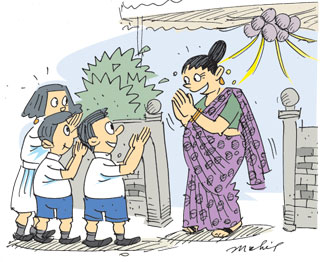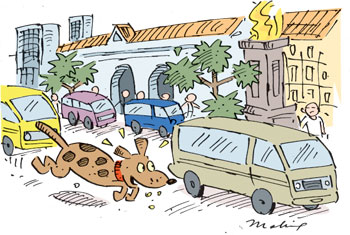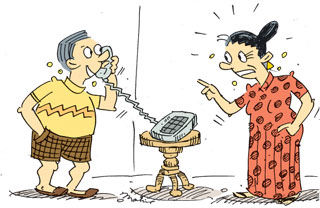|

by R. S. Karunaratne
Adjectives with ‘ed’ and ‘ing’ endings
We form adjectives from verbs adding ‘ed’ and ‘ing’ endings to them.
However, adjectives ending in ‘ing’ are different from those ending
in ‘ed’ as far as the meaning is concerned.
|

A charming lady welcomed us at the entrance. |
An adjective ending in ‘ing’ usually describes a thing or situation.
The robber had a frightening look.
We received an encouraging response from the fans.
The deal had a satisfying conclusion.
The students visited a fish canning factory.
A charming lady welcomed us at the entrance.
Adjectives ending in ‘ed’ usually describe how a person or animal
feels.
The frightened dog began to run along the crowded street.
There were many interested parties to buy the coconut plantation.
We are moving into a furnished apartment early next month.
The disgusted customers left the shop without buying anything.
A horrified crowd watched the plane crash.
We also use adjectives ending in ‘ed’ to indicate that something is
already completed or somebody has already done something.
The labourers packed the canned fruit in large boxes.
We decided to return the damaged goods to the supplier.
|

The frightened dog began to run along the crowded street. |
She used dried flowers to adorn her paintings.
Some adjectives ending in ‘ing’ and ‘ed’ have comparative and
superlative forms.
Sharon looks more excited than Aruni.
Gulliver’s Travels is more interesting than Madol Doova.
We are more interested in music than art.
Nanda’s songs are more charming than Sylvy’s.
[Activity]
Underline the correct adjectives in the following sentences. Check
your answers with the key.
1. Anuradha’s (charmed / charming) poems are popular with students.
2. A (furnished / furnishing) house is more expensive than a flat.
3. Your jokes are more (amused / amusing) than his.
4. It is (astonishing / astonished) how he escaped from the robbers.
5. Darsha is the (admiring / most admired) athlete in the country.
6. The (disgusting / disgusted) commuters complained about the poor bus
service.
7. Drug shortage is their most (worrying / worried) problem.
8. The lawyers felt (refreshed / refreshing) after the long tea break.
9. Some students were more (confused / confusing) than the others.
10. An (exciting / excited) group of supporters started shouting
slogans.
-------
Key:
1. charming 2. furnished 3. amusing 4. astonishing 5. most admired 6.
disgusted 7. worrying 8. refreshed 9. confused 10. excited
[Current English usage]
Being a living language English is subject to change from time to
time. Here’s help for you to keep abreast of changes in modern English.
1. Aborigines :
The singular form is ‘abroginal’ NOT ‘aborogine’.
2. Academic / academical :
‘Academic’ has something to do with learning or scholarship. Some
subjects are purely of academic interest.
‘Academical’ is associated with a place of learning or academy. We
have academical institutions.
3. Acceptance / acceptation :
The newspapers announced Roy’s acceptance of an honorary degree from
the Open University. ‘Acceptation’ means ‘an agreed interpretation
placed upon a word or a clause in a document’. It is an academic word.
4. Accustomed :
‘Accustomed’ expresses the notion that something is customary. It is
followed by the infinitive. Maya is accustomed to sleep immediately
after dinner. However, ‘accustom’ is a verb followed by a gerund.
Students must accustom themselves to getting up early.
5. Addicted :
‘Addicted’ is always followed by ‘to’ plus a noun or a gerund. Lal’s
father is addicted to drugs. (Noun) Sam’s uncle is addicted to gambling.
(gerund)
6. Adequate :
‘Adequate’ means ‘just sufficient’. It is followed by the preposition
‘to’. My income is adequate to my needs.
7. Adherence / adhesion :
Both words mean ‘sticking to’ but the usage differs. ‘Adherence’ is
used in a figurative sense. We adhere to our principles. ‘Adhesion’ is
used in a literal sense. The adhesion of a stamp to an envelope is
necessary.
8. Advance / advancement :
‘Advance’ means ‘progress’. We see evidence of the advance of medical
knowledge. ‘Advancement’ means ‘promotion’. He is a member of the Royal
Society for the Advancement of Science.
9. Aforesaid :
‘Aforesaid’ meaning ‘said or mentioned before’ is legal jargon. It is
not used in other contexts.
10. Agenda :
In Latin ‘agenda’ is a plural noun that means ‘things to be done’.
However, ‘agenda’ is treated as a singular noun in English. The plural
is ‘agenda’ or ‘agendas’.
Starters:
Forming questions with ‘Who’ and ‘What’
We can use ‘who’ or ‘what’ as the subject in a question.
Who lives in this house?
Who has got my laptop?
Who invented the telephone?
Who goes there?
|

Who are you phoning? |
Who gave you this book?
What’s your name?
What’s cooking?
What’s happening?
What’s burning?
What’s going to happen?
We can also use ‘who’ and ‘what’ as the object in a question.
Who did you meet at the library?
Who are you phoning?
Who do you like to meet?
Who are you following?
Who do you suspect?
What did you say?
what was he writing?
What did she give you?
What happened to you at the party?
What gives you happiness?
We use ‘who’ for people.
Who is your favourite author?
Who took my pen?
Who will win the election?
Who is coming today?
Who are you?
We use ‘what’ for things and ideas.
What’s your favourite novel?
What’s in your bag?
What do you like to eat?
What train are you waiting for?
What time do you go to bed?
[Activity]
Make questions with ‘who’ or ‘what’. Check your answers with the key.
1. Somebody lives in the apartment.
..................................................
2. Rani said something.
..................................................
3. He has lost something.
..................................................
4. Somebody has cleaned the classroom.
..................................................
5. Somebody asked me for a donation.
..................................................
6. Something happened in the morning.
..................................................
7. Father bought something for me.
..................................................
8. Somebody met me yesterday.
..................................................
9. I telephoned somebody yesterday.
..................................................
10. Somebody knows the solution.
..................................................
Key:
1. Who lives in that apartment?
2. What did Rani say?
3. What did he lose?
4. Who cleaned the classroom?
5. Who asked you for a donation?
6. What happened in the morning?
7. What did father buy for you?
8. Who met you yesterday?
9. Who did you telephone yesterday?
10. Who knows the solution?
Match the word and meaning
Match the words in column 'A' with their meanings in Column 'B'.
Check your answers with the key.
[Column A]
1. Boisterous
2. Bookworm
3. Boor
4. Breeze
5. Brickbat
6. Brine
7. Broadside
8. Chaos
9. Chef
10. Cheerio
11. Chieftain
12. Chink
13. Coarse
14. Cock-eyed
15. Coin
16. Colossal
17. Combat
18. Dangle
19. Decline
20. Defile
[Column B]
A. salty water
B. to make something dirty
C. to refuse something politely
D. to hang loosely
E. a fierce attack
F. a rude person
G. complete disorder
H. a light wind
I. goodbye
J. a rude remark
K. rough in texture
L. the leader of a tribe
M. a narrow opening
N. not straight
O. a piece of metal used as money
P. noisy, lively and cheerful
Q. very large
R. a fight
S. a professional cook
T. a person who is very fond of reading
Key:
1. P 2. T 3. F 4. H 5. J 6. A 7. E 8. G 9. S 10. I 11. L 12. M 13. K
14. N 15. O 16. Q 17. R 18. D 19. C 20 B
Indefinite articles
Fill in the blanks with indefinite articles (a, an) and check your
answers with the key.
1. ........... owl sleeps by day.
2. ............... writer uses pen and ink.
3. ............ woodcutter uses .......... axe.
4. Mother gave me ............. glass of milk.
5. Sam bought me ............ ice-cream.
6. ............ eagle is ........... bird that can fly very high.
7. Martin always carried ............. umbrella.
8. Sam didn’t wear .......... tie for the interview.
9. Give me .......... orange, I’ll give you .......... mango.
10. I don’t use ........... alarm clock but my father does.
11. This is ........... picture of Mona Lisa.
12. The policeman was riding .......... motorcycle.
13. The play was staged in .......... open air theatre.
14. What do you call ........... man who sells sweep tickets?
15. The train entered ........... a tunnel.
Key :
1. An 2. A 3. A an 4. a 5. an 6. An a 7. an 8. a 9. an a 10. an 11. a
12. a 13. an 14. a 15. a |

